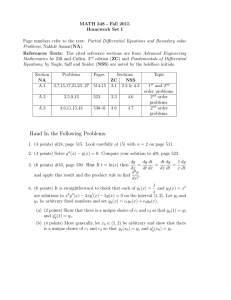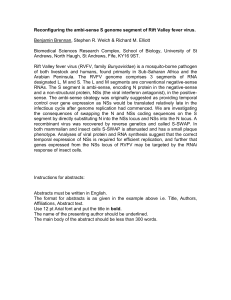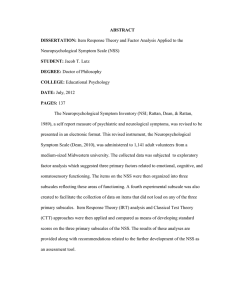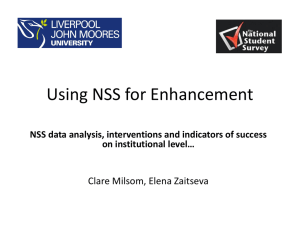A Summary National Statistical System Strategic Plan 2008-2012
advertisement
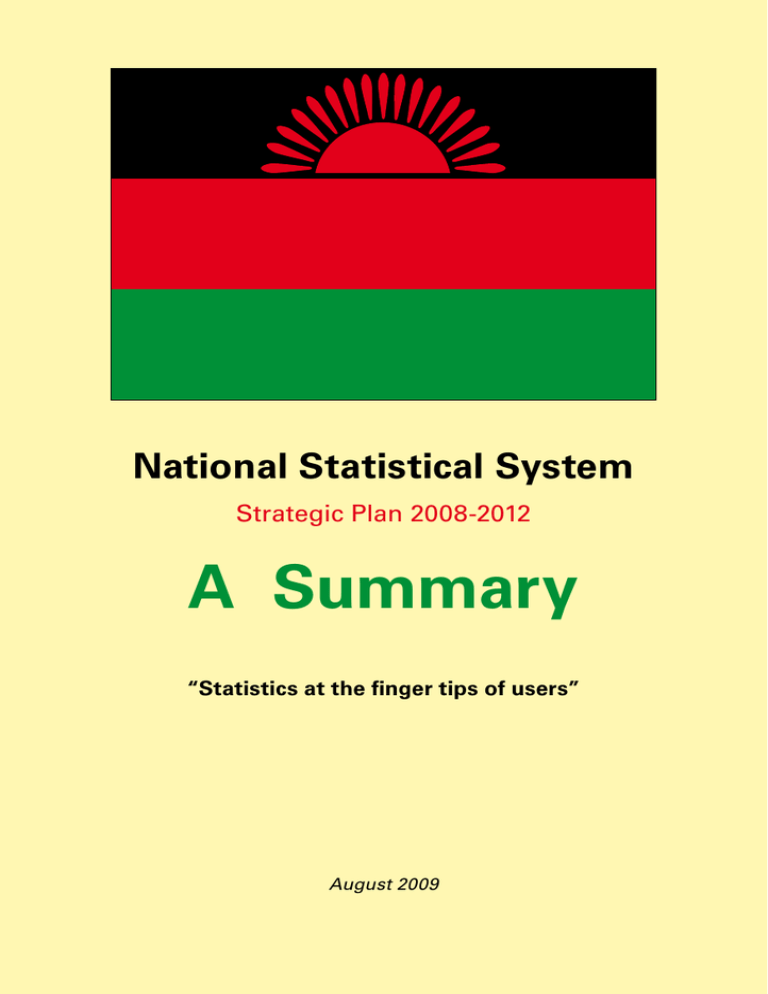
National Statistical System Strategic Plan 2008-2012 A Summary “Statistics at the finger tips of users” August 2009 Summary Due to the diversity of statistics needed for development plans and decision making processes, there are a number of ministries and departments that produce official statistics for internal and external use. As such there is need for proper coordination, harmonisation, standardisation of concepts and definitions on data collection, analysis and dissemination among producers to meet data quality demanded by users for evidence based decision making. The National Statistical Office (NSO) together with these sector ministries and departments, data suppliers and users form the National Statistical System (NSS). 2 The NSS Strategic Plan (SP) is a detailed guideline of costed activities of all agencies that are involved in collecting, analysing, disseminating official statistics on the one hand and those that use statistics on the other. Currently, it encompasses SPs from the National Statistical Office and six line ministries namely; Ministry of Agriculture, Ministry of Education, Ministry of Health, Ministry of Justice, Ministry of Labour and Ministry of Trade and Industry. Benefits of the National Statistical System • Increased availability of quality data • Efficient use of resources • Coordination, harmonisation, standardisation of concepts and definitions on data collection, analysis and dissemination among producers • Raise the public profile of statistics • Reduce response burden on data providers Cost for the NSS 2008 – 2012 In order to provide on demand quality statistics, there is need for heavy investment in statistics to carter for operational costs; capacity building, coordination in collecting, compiling and disseminating statistics. A number of strategic activities have been planned and costed to ensure proper coordination and harmonisation of activities in the system as follows: • Promote, coordinate and manage the National Statistical System • Produce better quality statistics • Enhance the service provided to users • Realise staff potential • Improve the profile of statistics in Malawi It is anticipated that a total of MK8 billion will be spent over the period 2008 – 2012 to finance the activities of the NSS. Mission of the NSS “To provide coordinated, standardized and harmonized official statistics and promote their use” Strategies for the NSS The NSS has eight strategies as follows: • Improve awareness and utilisation of statistics. • Improve management of the statistical common service. • Enhance human resource capacity for the production, compilation and use of statistics. • Improve the coordination and harmonisation of data collection, analysis and dissemination. • Improve compatibility of supporting technologies. • Improve storage, accessibility and dissemination of statistics. • Minimise risks associated with data collection and associated activities. • Develop NSS work plan financing strategy. 3 Statistical goals and cross-cutting themes Across the sectors, there are statistical goals and cross-cutting themes. These include: 4 • Promote, coordinate and manage the National Statistical System. • Produce better quality statistics. • Enhance the service provided to users. • Realise staff potential. • Improve financial planning and control. • Improve organisation and management. • Improve institutional infrastructure. • Improve the profile of statistics in Malawi. Challenges and constraints to NSS • Inadequate funding • Staff shortage • Old and outdated legal act • Weak coordination mechanisms • Invisibility of statistical units due to placement under planning departments • Inadequate capacity to collect, compile, analyse, store, disseminate and use statistics • Frustrated and de-motivated officers • Limited values of statistics • Low profile of statistics within sector ministries • Low investment infrastructure and equipment Opportunities for the National Statistical System »» Institutional structure is already in place to facilitate coordination »» Monitoring and evaluating the Malawi Growth and Development Strategy and other international development initiatives will place statistics high on the development agenda »» Continued support from the government »» Existing capacity to collect, compile, analyze, and publish statistical information Statistical work programme The following are proposed major surveys and administrative sources over the period 2008-2012 within the NSS Survey Period Implementing Unit(s) • Population and Housing Census 2008 NSO • Integrated Household Survey 2010 NSO • Demographic and Health Survey 2009 NSO • Labour Force Survey 2008 NSO • School Census Annually Ministry of Education • Annual Economic Surveys Annually NSO • Welfare Monitoring Survey Annually NSO • Agriculture Production Estimates Survey (APES) Annually Ministry of Agriculture • Health Management Information System (HMIS) Annually Ministry of Health • Education Management Information System (EMIS) Annually Ministry of Education • Market Information Surveys (MIS) Monthly Ministry of Agriculture • Criminal, Homicide, Civil Case, Deceased Estates Records Monthly Ministry of Justice 5 Capacity building programme for NSS Realization of a vibrant NSS will require investment in capacity needs and fill gaps by focusing on the following; 1. Organisational Development Functional review to consider the proposed new structure to enhance coordination of the NSO /NSS. »» Incorporate coordinating unit of the NSS in NSO. »» Upgrade statistical and management posts in the NSS. 6 2. »» »» »» »» »» Human resources Development Conduct training needs assessment and analysis. Investment in training Enhance on-the job training. Performance based promotions. Improved job satisfaction, enrichment and delegation. 3. Infrastructure Development »» Improve Information Communication and Technology (ICT) »» Standardize and harmonise statistics production systems in the NSS. 6. NSS Implementation building blocks The Success of the NSS is dependent on existing environment and past successes such as: »» Statistics Act – Relevance and appropriateness of legislation backed by political will. »» Good practice examples – Quick results from the most recent Population and Housing Census, re-basing and publishing of new series of National Accounts developed using Supply-Use Table, quality and timeliness of the Consumer Price Index (CPI). »» Goodwill from the general public. »» Coordination across NSS and donor group. 7. Costs and resources The NSS, through the statistical Sector Wide Approach (SWAp) initiative will enhance coordination among producers and providers of statistics as well as users who create demand for statistics. It is envisaged that the overall cost for the NSS program spanning 2008-2012 will cost as detailed below: Ministry / Department NSO Ministry Cost (MK’000) Division / Section Agriculture and Environment GOM Donors/ Partners Total 30,000 530,000 560,000 Demography and Social 194,400 3,016,400 3,210,800 Economic 137,500 681,800 819,300 Publications and Data Dissemination 49,300 115,100 164,400 NSS Secretariat 22,500 189,600 212,100 Administrative Program 556,683 920,280 1,476,963 Sub total 990,383 5,453,180 6,443,563 Agriculture and Food Security 120,810 Education Science and Technology 372,152 Health 395,200 Industry Trade and Private Sector Development 71,130 Justice 104,200 Labour 552,000 Sub total 1,615,492 Grand Total (NSO/NSS Sectoral Plans) 8,059,055 7 The SWAp is an approach to supporting statistical development across the NSS through a single, comprehensive programme and budget framework, centred on the Strategic Plans for the NSO and NSS, incorporating both government and donor resources. This booklet has been prepared by the National Statistical System Secretariat of the National Statistical Office through an advocacy team comprising of Ministry of Education, Ministry of Health, Ministry of Labour, Ministry of Information and Civic Education and the National Statistical Office. National Statistical Office P.O. Box 333 Zomba – Malawi Enquiries@statistics.gov.mw www.nso.malawi.net This Booklet has been prepared in collaboration with PARIS21
